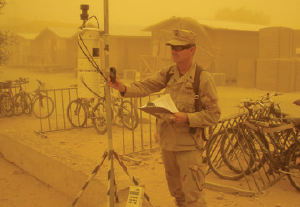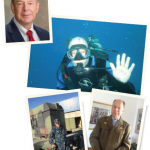“The effect of environmental stress, whether it’s prisoner of war or combat training, high altitude or space flight, affects the T cell function more than the B cell function,” he says. “It wasn’t unique to microgravity, probably just the stress of launch, re-entry or risk of something going wrong that affected the immune system.”
As it turned out, Dr. Meehan wasn’t deployed until the Gulf War in 1991, two years after leaving his job at NASA. Now divorced with two small children, he was working as a rheumatologist and immunologist at the University of Colorado in Denver.
He was among the 200 fleet hospital staff shipped to Bahrain, an island nation off the coast of Saudi Arabia. Often referred to as the Dirt Navy, the large tent hospital accommodated 500 beds and supported roughly 30 physicians who worked more than 12-hour shifts each day.
At the time, he says, everyone was very concerned about the welfare of warrior patients.
“We knew Saddam Hussein had used chemical weapons on the battlefield against civilians and in the war with Iran, so he was willing to use it on our forces,” Dr. Meehan says. “There’s very little defense if you use chemical weapons on the battlefield. You have to pack up and leave; you can’t stay and function.”
Evacuating soldiers and Marines for medical reasons wasn’t always easy. Despite the horrors of war, he says, no one wanted to leave, because they were very dedicated to each other.

Dr. Meehan conducted particulate sampling during a dust storm at the Al Asad Air Base in 2008, which led to the founding of the NJH Center of Excellence on Deployment-Related Lung Disease. Cecile Rose, an occupational medicine pulmonologist, and Dr. Meehan serve as the director and co-director, respectively. Their current research is investigating the role of inhalation exposures on small airway injury among military personnel who were deployed to Southwest Asia.
He tells the story of one soldier who was in intensive care due to severe asthma. Although he was going to be evacuated back home, he vehemently protested, recalls Dr. Meehan. The soldier was in charge of operating a battery of Patriot missiles, which destroyed SCUD missiles fired by Iraqi soldiers loyal to President Hussein that could be armed with chemical or biological agents.
“If he got evacuated, then the Patriot missiles wouldn’t knock out the SCUD missiles as effectively,” Dr. Meehan says, adding that to help save soldiers’ lives, he reversed his decision and ensured that the soldier’s medical officer had 24/7 access to hospital staff to help treat his asthma. “In military medicine, sometimes you make medical decisions that can impact a lot of people.”
